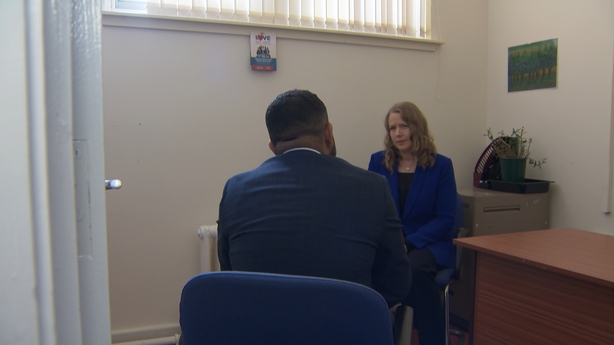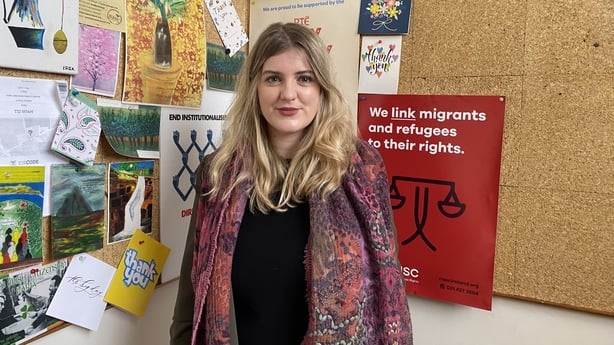Ali says he joined the Afghan armed forces because he says he wanted to make his country a better place, but it is a decision he now he regrets.
He lives in Ireland, but he has family still in Afghanistan and they are in hiding from the Taliban.
He says they are paying the price for his military career.
"I arrested many Talibans... and now they are all released from prison, they are back on the streets and they are running the Government," Ali explains, "so I'm really worried about my family."
Sitting in the NASC refugee and migrant support centre, he tells me how he lost one brother, shot dead in what he believes was a reprisal attack even before the Taliban regained power.
Then when the Afghan Government fell last August he says his home was ransacked and his remaining brother was beaten and tortured by men looking for Ali.
This day last year, with the opening of the Afghan Admission Programme Ali hoped that he would soon be able to get them to safety.
"I think the initial plan was that this would be the fastest scheme for people to be evacuated from Afghanistan, but unfortunately it was the slowest scheme ever," Ali says.

When the scheme was first announced a month after the fall of the Taliban, Minister for Foreign Affairs Simon Coveney said it would "create a tailored family reunion programme" and would "enable Ireland to better respond to the situation in Afghanistan."
That was in September 2021, the programme began accepting applications in December and the closing date was in March this year.
However the Department of Justice has confirmed that it was November before any decisions were made.
That's over 10% of the 500 places available, but the scheme was oversubscribed and hundreds more await a decision.
The Department's figures also show that 528 sponsors made applications on behalf of their relatives, and that the total number of scheme hopefuls came to 1,492, almost triple the number of places available.
To date no negative decisions have been handed down.
RTÉ understands that it was months before applicants got any word beyond confirmation that their initial submissions had been received.
Both the Irish Refugee Council, and NASC refugee and migrant support centre confirmed that since autumn, garda vetting of sponsors has been taking places and that there have also been requests for more documentation.
This week the Department of Justice confirmed that it has been contacting people "where applicants are missing important information... such as proof of identity and familial relationships" and that "over 95% have been contacted to date" and that "the requested information has begun to be received"
Managing Solicitor at the Irish Refugee Council's Independent Law Centre Katie Mannion said that in some of these instances the relevant documents had already been submitted.
"I think even though documents weren't required to be translated... they don't see the relationships between people in the documents, for example, if they hadn't been translated," Ms Mannion explained.
The Irish Refugee Council and its four pro bono legal partners together oversaw around 190 applications to the scheme, and around ten positive decisions have been received to date.

NASC supported 35 applicants hoping to bring relatives here under the scheme.
"None of the people that we worked with have received a positive decision yet. What they have received is requests for more information, so it's quite frustrating for people" Fiona Hurley, CEO of NASC said.
"People made the applications with a great sense of urgency, their families are living in really precarious or really difficult circumstance, and they are just worried for them" Ms Hurley said.
And these are only the people who applied for the scheme.
As well as limiting the number of potential beneficiaries, certain cohorts were not included, such as married siblings for example.
A sponsor also had to prove that there was accommodation available, from the time the application was submitted, and that they will be financially responsible for beneficiaries who will not have access to social welfare, housing supports or child benefit.
"It was very challenging, the requirements and also the documents" Ali said, "it's very hard to get documents like passports, marriage certs and birth certs... it's very costly.
Ali said he borrowed from his credit union and from friends to afford the "thousands of euro" it all cost.
But now he says his family is losing hope.
"My family, you know they really believed in me, and I always tell them, look I'm working very hard to hopefully get the application through and hopefully we will get visas to bring you here. Now members of my family believe that I am just telling them stories to keep them calm... that maybe I'm lying because what kind of system take this long, to find out either way," Ali said.
The CEO of NASC said other applicants share Ali's frustrations, especially as the humanitarian situation in Afghanistan continues to deteriorate.
"People spent money on acquiring documents for their family that they might otherwise have used to pay for accommodation or for food," Ms Hurley said.
The Department of Justice has said that it will continue to access applications "in a pragmatic and humanitarian manner with a view to issuing more decisions soon."







